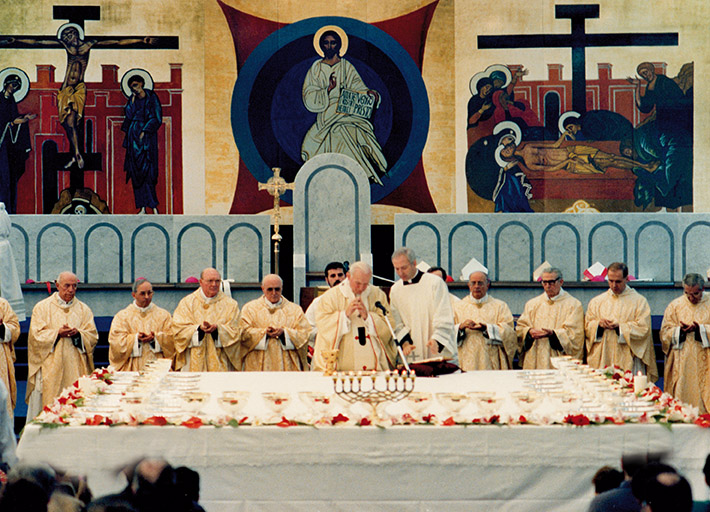Eucharist and sending families for the “New Evangelization” December 30, 1988
St. John Paul II
Feast of the Holy Family Porto San Giorgio, December 30, 1988
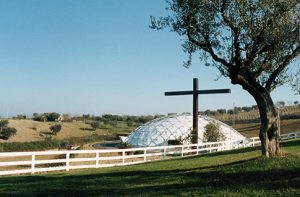
The Mission of Truth, Love, and Life
“With all your prayers, with your testimony, with your strength, you must help the family, you must protect it against any destruction”, said John Paul II addressing the Neocatechumenal families who are going to depart for the mission and that this morning, Friday 30th of December, have participated in the Holy Mass celebrated by the Pope in the “Servant of Yahweh” Center of Porto San Giorgio. During the homily, the Holy Father has also reminded those present that “today is the day that the Holy Family must speak to us through our assembly …”
This is the text of the homily given by John Paul II:
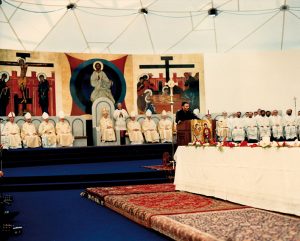
“May Jesus Christ be praised. Dearly beloved, we are living the Christmas period. In this period we live in faith the great divine mystery, the mystery of the most Holy Trinity in mission. It was known and confirmed that God was one and only one.
We can also accept what Paul said when he spoke at the Areopagus, that God is that spiritual absolute in whom we live, in whom we move, in whom we have our being. But what was not known, and what many today still have difficulty in accepting, was the profound reality of God the Trinity in whom we live, in whom we move. And He, Trinity in mission, is not only an absolute being, above all others, but the Father in his infinite, inscrutable reality who generates his Word from eternity without beginning.
And with this his Word, he lives the ineffable mystery of Love, which is a person and not only an interpersonal relationship; it is a person, the generated Son, the Spirit, Love breathed out.
Every year, the holy time of Christmas reminds us of this mystery of the Trinity in mission, in the Night of Bethlehem, this mission of the Son, sent by the Father to bring us that Holy Spirit by whom he was conceived in the Virgin. He comes to bring us this Spirit. The night of Christmas is this night in which the reality of God-communion, the unity of the Divinity, absolute unity, unity in the communion, comes close to our human mind, to our eyes, to our history and becomes visible. That is, the hidden mystery, the “Mysterium absconditum a saeculis” becomes visible, the mystery hidden from all time becomes visible. By means of this poor reality of the birth of the Lord, of the Manger, of the Night of Bethlehem, of Mary and Joseph, the great mystery of the Trinity in mission is revealed. Here is our God: this is our God! Ineffable mystery! This is how we must speak, this is what we must confess, witness to, knowing our inadequacy in front of the inscrutable mystery of God, divine unity, unity of the divinity, and at the same time unity of communion.
During this Christmastide, the Holy Mother Church has us celebrate today another human mystery: the Holy Family of Nazareth. We contemplate this reality, this mystery of the Trinity in mission. During the Christmas period, we contemplate it with a special depth and with intense joy because this mission – the Word sent to the world to speak in person of his Father, of the divine reality, the Word comes in this night as a human baby, poor, stripped of everything; in this moment already stripped – he could not be born in any other way. No human richness could provide an adequate context for the human birth of the eternal Son of God. Only that poverty, that abandonment, that Manger, that Night in Bethlehem could do so. It was right that no lodging could be found in that little town.
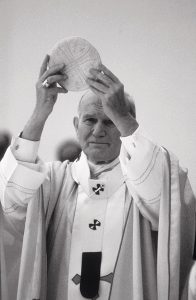
Dearly beloved, we contemplate this divine reality, the Most Holy Trinity in mission, and at the same time we feel how inadequate to talk of this mystery are our human concepts, our poor human words. Nevertheless, he who was sent to us, the Word, comes to speak and comes also to make us speak. More than that, he sought out those people who were most simple to take up this Word, this divine Word; he sought out the most simple. We have to say that we are contemplating today the family in mission, because the Holy Family is nothing other than this: the human family on the divine mission. And here, this human family like a smaller community, shows itself to be, at the same time, like a big human community which finds itself on the divine mission: this is the Church. Particularly in the Second Vatican Council, the Church has recognized her family and her missionary character. She is a great family in mission. Inside this great family-Church is every human family, every family community, as family in mission. A lot is talked about the family as a smaller, more basic society and all this is true. But when we see the principle mystery constituted by the Trinity in mission, we cannot see the family outside this context: it, too, is in mission. And its mission is really fundamental, fundamental for the divine mission of the Word, for the divine mission of the Holy Spirit; it is fundamental.
The divine mission of the Word is that of speaking, of giving witness to the Father. It is the family which is the first to speak, the first to reveal this mystery, the first to witness before the new generations to God, to the Father. Its word is more efficacious. And so every human family, every Christian family, finds itself on a mission.
This is the mission of Truth. The family cannot live without Truth; more than that, it is the place where there is an extreme sensitivity towards the Truth. If truth is lacking in relationships, in the communion of persons – husband, wife, fathers, mothers, children – if truth is missing, communion is broken, the mission is destroyed. You all know well how subtle, how delicate, how very vulnerable, is this communion in the family. And so in the family is also reflected – together with the mission of the Word, the Son – the mission of the Holy Spirit which is love. The family is in mission, and this mission is fundamental for every people, for the whole of humanity; it is the mission of Love and of Life, it is the witness of Love and of Life.
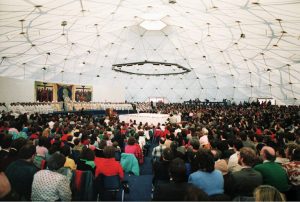
Dearly beloved, I came here very willingly. I accepted very willingly your invitation on the Feast of the Holy Family to pray with you for the most fundamental and most important thing in the mission of the Church: for the spiritual renewal of the family, of the human and Christian families of all peoples, of every nation, perhaps particularly those of our western world, which is more advanced, more marked by the signs and benefits of progress but also by the failures of this one-sided progress. If one is talking about a renewal, about a regeneration of human society, even in the Church as a society of men, one has to begin with this point, with this mission. Holy Church of God, you cannot carry out your mission, you cannot fulfill your mission in the world, if not through the family and its mission.
This is the main reason why I accepted your invitation to be together and to pray together in this gathering made up above all of families, of couples, of children, indeed of itinerant families. It is a beautiful thing. We see that the Family of Nazareth was also an itinerant family. And it was so quickly, from the first days of the life of the Divine Infant, of the Word Incarnate. They had to become an itinerant family and also refugee.
Many painful realities of our time – that of refugees, for example, or of emigrants – are already engraved, are present in the Holy Family of Nazareth. For you, this Family is above all an itinerant family because it goes everywhere: it goes to Egypt, it comes back to Nazareth, it goes back to Jerusalem with the twelve year-old Jesus, it goes everywhere, always as itinerant to bring a testimony of the family, of the divine mission of a human family. I think that you as Neocatechumenal, itinerant families do the same thing: you constitute the aim of your itinerancy which is that of bringing everywhere, to the most dechristianised environments, the witness of the mission of the family. It is a great witness, great in human terms, great in Christian terms, divinely great, because such a witness, the mission of the family, is conclusively inscribed in the path of the Most Holy Trinity. In this world, there is no other more perfect, more complete image of that which is God; Unity, Communion. There is no other human reality which corresponds more to that divine mystery. And so, bringing as itinerants the witness, which is properly that of the family, of the family in mission, you bring everywhere the witness of the Most Holy Trinity in mission. And so you make the Church grow because the Church grows from these two mysteries. As the Second Vatican Council teaches us, all the vitality of the Church comes finally, or principally, from this mystery, from this mystery of the Trinity in mission. Together with this you bring the witness of the family in mission which tries to walk in the footsteps of the Trinity in mission. And in this way also a message is brought, the message of Bethlehem, the message of Christmas, a joyful message. We know that this message too, according to traditions and customs, is always linked to human families. It is the feast of the family. This feast needs to be given a deep breath of life, a full dimension, full in human terms, full in Christian terms, divinely full because this human mystery, this human reality of the family is rooted in the divine mystery, in the mystery of God communion. You are communion, communion of persons like the Father, the Son and the Holy Spirit.
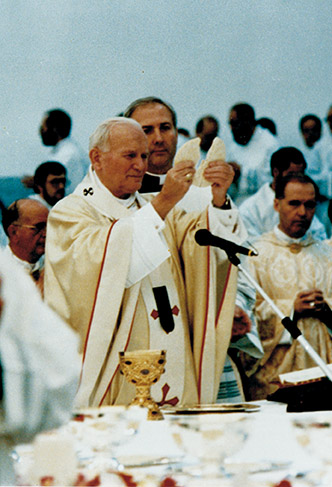
You are communion of persons, you are unity. You are unity and you cannot not be unity. If you are not unity, you are not communion; if, instead, you are communion, you are unity. There are many families in this world of progress, rich, opulent, who lose their unity, lose communion, lose their roots. Here you are itinerants to bring the witness of these roots; this is your catechesis, this is your Neocatechumenal testimony: this is how the fruitfulness of Holy Baptism is spoken of. We know well that the sacrament of Matrimony, the family, all this grows in the sacrament of Baptism, from its richness.
To grow in baptism means to grow in the paschal mystery of Christ. Through the sacrament of water and the Holy Spirit, we are immersed in this paschal mystery of Christ which is his death and his resurrection. We are immersed so as to find again fullness in life and of the person but, at the same time, in the dimension of the family to bring to, to inspire with this newness of life different environments, societies, peoples, cultures, social life, economic life … All this is through the family. You must go throughout the world to say to everyone that it is ‘through the family’, not ‘at the cost of the family’. Yes, your program must be fully evangelical, full of courage, courage in giving witness, courage in speaking, speaking before everyone, above all before our brothers, before people, before our sisters, families and couples, all these generations. Before everyone. With this great witness, the family in mission as image of the Trinity in mission must also carry forward a socio-political, a socio-economic program, I would say. The family is surrounded in all this and can be helped, carried along, privileged, or it can be destroyed. You must, with all your prayers, with your testimony, with your strength, you must help the family, you must protect it against every kind of destruction. If there is no other dimension in which man can express himself as a person, as life, as love it has also to be said there is no other place or environment in which man can be so destroyed. Today many things are being done to normalize this destruction, to legalize this destruction; a profound destruction, deep wounds in humanity. Much is being done to systematize, to legalize this. In this sense people speak about ‘protecting’. But the family cannot really be protected without going to the roots, without entering into its deep reality, into its intimate nature; and this intimate nature is the communion of persons in the image and likeness of the divine community. Family in mission, Trinity in mission. Dearly beloved, I do not want to go on, I do not want to prolong this. I leave you these reflections which come to me spontaneously.
Today is the day on which above all else the Holy Family must speak to us and this is my humble prayer: that this Holy Family of Nazareth, through our assembly, through our songs, through our prayers and also through these words of mine, may speak to all of us.
Amen.”
